I’m reading Jai Arjun Singh’s The World of Hrishikesh Mukherjee: The Filmmaker Everyone Loves these days (yes; a review will be posted sometime this month). A few pages into the book, and I came across a mention—followed by more interesting stuff—about a film I’d run into once, about ten years back. Biwi aur Makaan, of which I’d happened to find a VCD and had happily bought, guessing (from the synopsis on the VCD cover) that this might be fun.
That VCD turned out a dud: the first disc was fine, the second refused to play. So I set Biwi aur Makaan aside (regretfully), and ended up forgetting about it. Until earlier this week, when, reading Jai’s book, I was reminded of it, and on a whim, decided to see if I could find it on YouTube. Sure enough, there it was. And here is my review.
Biwi aur Makaan centres round five young men, bosom buddies from their college days, who have adopted the Three Musketeers-ish motto “One for five and five for one.” They call themselves the paanch Pandavs, and have vowed that they will stick together (which means living together) until each of them has a job and is independent. So much so that the most enterprising of the lot, Sitaram Pandey (Mehmood), despite being a married man, has left his wife in the village with his parents while he battles it out with life in the big bad city of Bombay.
The film begins with a song sung in a recording studio by the second of the paanch Pandavs, Arun (Biswajeet). Arun’s a good singer (he also has the odd ability of being able to sing convincingly in both male and female voices), and is told by the song producer/composer/whatever that he has a bright future ahead of him.
Right now, though, Arun and his four pals are more worried about accommodation than their careers. Pandey, Arun, Suresh (?), the girl-shy painter Shekhar (Ashish Kumar) and an unemployed and therefore depressed Kishen (Keshto Mukherjee) live at a place known as Rambharose Hotel. Rambharose Hotel, though it’s named after its owner, Rambharose (Moni Chatterjee), seems, punnily enough, to be pretty much rambharose itself, surviving by the will of God.
One evening, for instance, the friends find their tea has no sugar in it. The electricity in their room goes off arbitrarily, too.
But is this just slipshod management, or something else?
… because one evening Rambharose bursts into their room and accuses them of bringing in women. Our heroes are rightly indignant, but Rambharose fetches a bunch of ‘good’ citizens, who go about opening cupboards and pulling up bedcovers to reveal girls they’ve planted in nooks and crannies while our boys have been out. Pandey & Co. protest their innocence, but nobody’s listening. Rambharose, whose aim is to get rid of these men, gives them notice: find another place to stay.
The five friends therefore go out looking for other accommodation—and keep drawing a blank wherever they go. There seems to be no place available.
Until, one evening, Suresh comes bearing news. He has found a place. Three rooms, a rent of a mere Rs 100, no advance.
So, of course, there’s a hitch. The old gentleman, Mr Mishra, wants to rent his house only to married couples; no single men allowed.
The majority of faces fall flat, but Pandey is ebullient: there will certainly be some way out of this, he figures. Let’s go and pay them a visit.
Pandey and Suresh go and meet Mishraji (Brahm Bhardwaj). This man suffers from extremely high blood pressure, which pretty much confines him to his own rooms. His wife, whom he summons to meet their prospective tenants, turns out to have such bad eyesight that she’s nearly blind.
Pandey takes a quick decision: yes, please. This house will do perfectly for them. They’d like to shift in as soon as possible. Mr Mishraji is amenable, as is his missus.
When they’re out of the house, Pandey sits down to figuring out how to go from being five bachelors (or, to be technically precise, four bachelors and one married man without his wife) to married couples. A chance glance at a film poster—advertising an old film in which a male actor played a female part—gives Pandey an idea, and on his way back to Rambharose Hotel, he stops to do some shopping.
When he arrives, it’s with some mysterious parcels. Shekhar and Suresh are made to wait outside while Pandey whisks the baffled Arun and Kishen into the other room. A while later, the door opens, and out come Pandey and his two still-dazed protégées. Now dressed and made up as women, and actually pretty much looking the part.
While Pandey’s explaining the plan to Suresh and Shekhar (not to mention Arun and Kishen, who look as if they don’t know what’s hit them), Rambharose comes blundering in, sees a glimpse of these two ‘women’ and is aghast. They’ve actually got women here! He raises a ruckus, but before the indignant neighbours can arrive, the ‘women’ have dashed back into the room and slammed the door behind them.
By the time the janta gathers around and a furious Rambharose insists on the door being opened, who should saunter out but Arun and Kishen, looking their usual selves. When a nosey Rambharose and his cronies enter to investigate, they find nothing. This gives our heroes (especially Pandey) the opportunity to pass some snide remarks about baseless accusations, before letting Rambharose know that they’re leaving. And they’ll be taking Rs 100 as compensation for the damage to their collective reputations, thank you.
The Mishra residence soon sees the arrival of the new tenants. Suresh is the only bachelor; Pandey introduces ‘Krishna’ as the badi bahu, his wife; and ‘Aruna’ as chhoti bahu, Shekhar’s wife. When Mrs Mishra, welcoming them in, asks about children, Pandey glibly tells her that as for Shekhar and chhoti bahu, they have two children, but since Shekhar is an only child and his parents miss him so much, the kiddies have been left with them—the grandparents—to be brought up.
And what about Pandeyji and badi bahu? asks Mrs Mishra. He says that they’ve been married seven years, but don’t have any children yet. Mrs Mishra is suitably sad for them, and offers words of consolation: they shouldn’t worry; all in good time. They too will be parents.
Barely have the two ‘couples’ and their friend Suresh settled into their new home than unexpected visitors arrive. Not even visitors, because these people are actually members of the family: Mishraji’s daughter Geeta (Kalpana) and her cousin Leela (Shabnam). These girls have been studying in a college in Delhi, but have managed to get transferred back to this city, so are delighted to be back home. The Mishras are equally happy to have them back.
… and two of the young men are thrilled. One is Arun, who immediately falls for Geeta. The other is an unlikely candidate: Shekhar, so far so terrified of women that he starts hiccupping as soon as one approaches, but is now bowled over.
For Arun, it’s not too much of a problem (after all, generations of filmi men have successfully juggled disguises). Soon enough, an Arun sans makeup, saree, and wig, has been passed off as the chhoti bahu’s younger brother Arun, and has charmed Geeta.
For Shekhar, it’s not such smooth sailing. Leela likes him, but he is, after all, a married man. Her chhoti bhabhi’s husband, no less. Leela looks a bit uncomfortable when Shekhar asks hesitantly if he may paint a portrait of hers, but when he attempts (even more hesitantly) to bare his heart to her, she treats him with revulsion. How crass can he get?! A married man, and making overtures to another woman!
How long can the charade be carried on? Will Shekhar crack? And what about Pandey’s wife (Padma Khanna), stuck in the village and waiting for him?
I regret not having continued to search for this film after that first aborted attempt to watch it. In a cinema that’s known more for drama (and melodrama) than comedy, Biwi aur Makaan is one of the most delightful outright comedies there is. It needs to be far better known than it is.
What I liked about this film:
The writing and direction, which are superb. There’s nothing here that’s superfluous, nothing that doesn’t, in some way or the other, help add to the plot. Even something as minor as Pandey, on the fly, saying that he and ‘badi bahu’ don’t have any children, leads to hilarious consequences. Part of the fabulousness of that writing are the dialogues, some of which have amusing references to Hindi cinema. (Geeta, for instance, talking about Arun to her friends: “Khoobsoorat bhi ho, aur gaana bhi gaaye? Yeh toh sirf Hindi filmon mein hota hai”—“That he should be handsome, and should be able to sing songs? That happens only in Hindi films!”)
Or, another example: when Rambharose, having seen the two ‘women’, comes bursting in with righteous indignation and equally indignant friends, only to be deflated moments later, Pandey shoos the lot out, yelling at them as they leave, “Chidiyaghar samajh liya hai kamre ko, mann aaya andar ghus aaye!” (“Do you think this room’s a zoo? Whenever you feel like it, you come rushing in!”)
Which brings me to another highlight of Biwi aur Makaan: Mehmood. Mehmood, unlike Johnny Walker, is not a quintessential favourite of mine. I like him in some films, find him tiresome in others. Here, he reigns supreme. Pandey is the ‘director’ of this drama; he is the one who calls the shots, improvises (often on the fly), solves problems (even if only in the short term), and just generally lords it over his four relatively passive friends. He’s a livewire, and his dialogues, often in a dialect (Bhojpuri?) are a delight. So is Mehmood’s acting.
And, the overall light-heartedness of the film. This is Hrishikesh Mukherjee at his best: not trying to get across any major message (except possibly that young people trying to get a start in life deserve a helping hand, not silly obstacles like having to be married). Nobody’s required to be noble and self-sacrificing; nobody’s pitch-black or snow-white, and the only somewhat nasty character, Rambharose, gets his come-uppance when his five tenants leave, having taken Rs 100 from him as damages.
What I didn’t like:
I was underwhelmed by the songs. With Hemant as composer, I’d have expected Biwi aur Makaan to have had a good score, but the music is forgettable. Some of the songs are recommended for their lyrics (Gulzar is very good with the humour), but that’s about it. There are also, as far as I’m concerned, perhaps four songs too many. Fewer songs, and I might’ve appreciated them more.
But that’s it—and it’s not an irritant. If you haven’t watched Biwi aur Makaan already, and if you like Hrishikesh Mukherjee’s comedies, this one’s a must-watch.

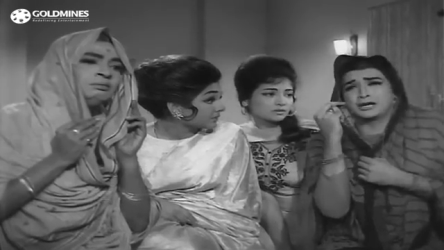
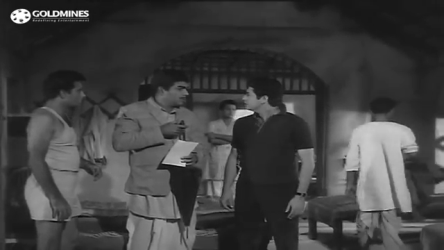
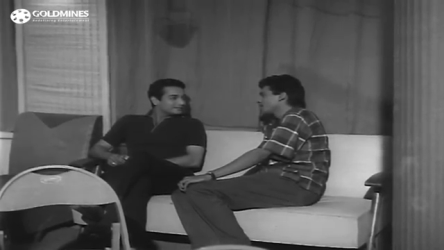
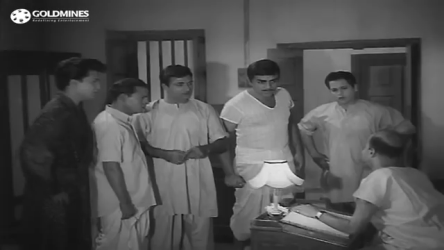
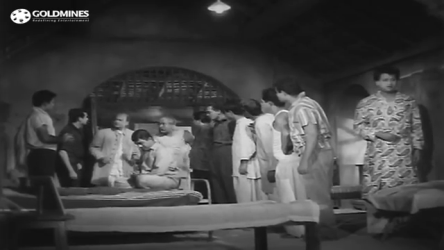
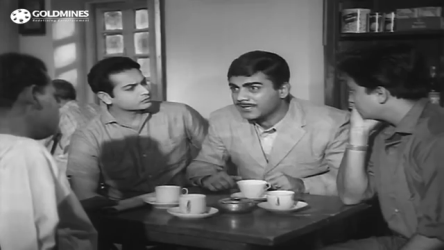
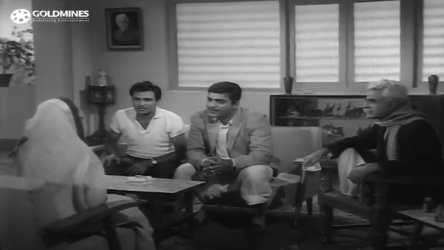
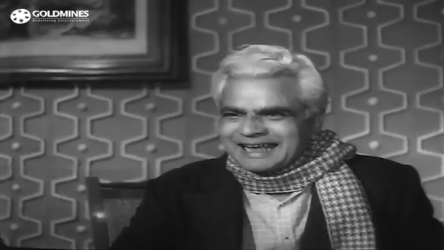
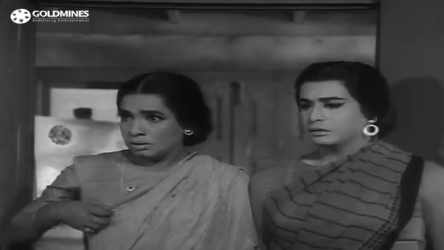
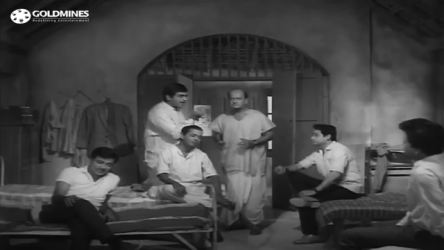
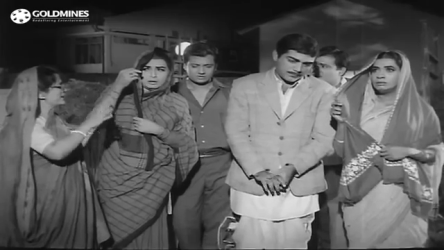
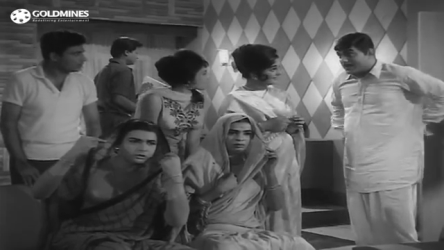
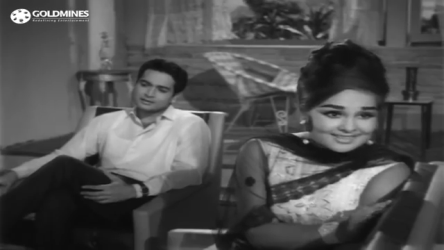
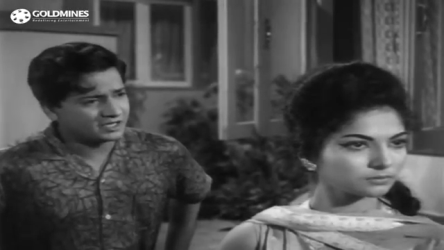
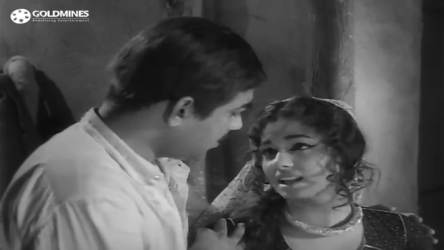
Not having heard of Biwi aur Makaan until then, it was only after I read Sharmi’s review of it a long time ago that I actually went looking for it. And yes, I found it on YouTube. :) This was one film that I actually liked Biswajeet in – and unlike a lot of heroes in drag, he actually carried this off very well, considering he spent about nearly half of it dressed in saris. I agree with you about Mehmood – not usually my cup of tea, I find him so over-the-top – here, he showed what a brilliant actor he could be, if he had a director who reined him in. I also agree about the songs – too many, and seriously underwhelming. I excepted more from Hemant Kumar and Hrishikesh Mukherjee.
All in all, a very pleasant watch, and I second your opinion that it should be better known than it is. Thanks for reminding me of this one,
LikeLike
“This was one film that I actually liked Biswajeet in – and unlike a lot of heroes in drag, he actually carried this off very well, considering he spent about nearly half of it dressed in saris.”
Actually, even that half-a-VCD I watched all those years back left me with one impression: both Biswajeet and Keshto Mukherjee made fairly convincing women (well, Keshto Mukherjee was by no means a pretty woman, but still believable). Unlike the usual man in drag. What I also find laudable are the small mannerisms and gestures that they adopt – even, I noticed, a style of sitting, or of placing a hand on a sofa back – that is really quite distinctly feminine. Good attention to detail there, by Hrishikesh Mukherjee.
LikeLike
Nice introduction (as usual. :D ) to a film that usually flies under the radar. This was remade in Marathi in 1988 as “Ashi Hi Banwabanwi” with Ashok Saraf, Sachin, Laxmikant Berde etc.
YouTube link: https://www.youtube.com/watch?v=e-OvJwoi_lM
LikeLike
Thank you, Milind! I hadn’t known the film was made in Marathi too. Someone I know informed me that it was originally in Bengali, but that she liked the Hindi version more than the Bengali original.
LikeLike
I watched this movie few years back on youtube. I thought, Hrishikesh Mukherjee, Gulzar and men in drag, what can go wrong here. And I was hugely disappointed. It fell totally flat for me.
But since you are singing paeans in praise of it, I’m tempted to watch it again.
LikeLike
BTW, Shilpi told me that Shammi dubbed for Biswajeet in drag in this film, thus the feminine voice. Is it mentioned in the credits?
LikeLike
No, it’s not mentioned. Thank you for telling me that – I was wondering who had dubbed the female voice for Biswajeet.
LikeLike
That’s interesting… I suppose it’s a question of the eye of the beholder, and all. I know plenty of people will shoot me down for refusing to share their enthusiasm for Guide or Mother India, so I will not try to convert you. ;-) Let’s agree to disagree on this.
LikeLike
Oh no, I’ve started liking some films on second viewing, though the list of disappointment at second viewing is longer than it. Hitchcock’s Family Plot (1976) is a good example. Maybe the many songs in Biwi aur Makaan, and that also not good, turned it off for me.
I know your lack of enthusiasm for Guide and Mother India, your feelings for the latter I share, but not for the former. Guide is one film, which has never declined in taste for me..
Returning back to Biwi aur Makan, were the dialogues also by Gulzar as I had presumed?
LikeLike
Harvey, dialogues are by Rajendra Singh Bedi. Gulzar only wrote the song lyrics.
LikeLike
Thank you for answering that for me. :-)
LikeLike
Thanks bollyviewer. they didn’t sound like Gulzar to my ears, well, most of the songs didn’t either.
LikeLike
So do you mean to say that you didn’t like Family Plot the first time you saw it, and began liking it later? Or was that a disappointment? Personally, I really liked that film – I’d started watching it somewhat warily (I’m so fond of Hitchcock’s early films, I wasn’t sure whether or not I’d like something made in such a different style from what I regarded as his ‘usual’)… but I ended up loving it. So delightfully black, the humour in it.
LikeLike
Family Plot was also a love at second sight for me. Agree with, “So delightfully black, the humour in it.” I enjoyed it a lot. Humourous, though sinister throughout.
LikeLike
Yes. Remind me again: have you seen The Trouble With Harry? Another of my favourite offbeat Hitchcocks. :-)
LikeLike
The Trouble With Harry is easily the best black comedy I’ve seen till date. Talking of Hitchcock, I prefer his late British/ early American movies. I liked movies from that period (Rebecca, Shadow of a Doubt, Strangers on a Train, etc) far more than his more acclaimed works like Vertigo or North by Northwest
LikeLike
Same here! I prefer his late British and early American films more than the ones for which he’s better known – except, possibly, Rear Window, which is a favourite of mine. And The Trouble With Harry is in a class by itself. Simply superb.
LikeLike
LOVE that film. It is so much more like a French film, rather than Hollywood.
LikeLike
:-D
LikeLike
It’s been a while since I’ve seen “Biwi aur Makaan” but I remember it as a pleasant, amusing watched. I think it mainly produced smiles rather than guffaws in moi. Agree on Mehmood – he’s a very movie-dependent taste for me (same with Kishore). The leads, Biswajit and Kalpana find even less favor, but I didn’t mind them in this one.
I’m a bit more positive on the music and rather like two songs – “dabe labon se”, and “jaane kahan dekha hai.” The rest of the songs, I agree, are blah – contextually appropriate but not something I ever listen to on their own.
LikeLike
This film was actually one of the rare cases of one where I thought the lyrics of the songs (except for Aise daanton mein ungli and Jaane kahaan dekha hai tumhe, both of which were fairly standard) far outdid the music of the songs. The lyrics are funny, the music forgettable. And there are too, too many songs.
“I think it mainly produced smiles rather than guffaws ”
I have to admit I have almost never guffawed at a Hindi film. A giggle or two now and then, but no more. Chupke-Chupke and Pyaar Kiye Jaa are perhaps the funniest Hindi films for me, with Golmaal a close runner-up. And Andaaz Apna-Apna.
LikeLike
Great find, Madhu! I had never heard of this before. Your review tempted me to watch right away — just finished watching it and found it very entertaining. Biswajit and Keshto Mukherjee made fairly believable women. :-) It would have been much better without all those boring songs (Gulzar+Hemant Kumar+Hrishikesh Mukherjee and they come up with that?!). Loved the “swashbuckling” fight at the end and Mehmood’s quip about film Suraj! All in all, a pretty fun watch.
LikeLike
Welcome back, Bollyviewer! Good to ‘see’ you again. :-) And I’m glad you enjoyed this film. It’s such a pity, isn’t it, that funny little films like this tend to slip into oblivion – like Dholak (thank you for recommending that one to me!) or Gustakhimaaf.
Yes, I can’t fathom how a combination like Hrishikesh Mukherjee and Hemant could’ve come up with such lacklustre music. I don’t blame Gulzar as much, because I think the bulk of the songs actually have pretty amusing lyrics, if you listen carefully, but the music lets them down.
LikeLike
This is another of Hrishida gems but unfortunately its relatively obscure. The performances are good throughout, be it Mehmood, Biswajit, Keshto or Ashish Kumar. The music is a big letdown though i agree. Strangely one of my fav Hemant numbers is from the soundtrack of this film, but i don’t know why this song was edited out of the film for heaven’s sake. Here’s the youtube link-
Hemantda had earlier used the same tune for his superhit bangla song ‘Ashar Srabon Mana na toh Mon’ by Lataji in the 1966 film ‘Monihar’. Here’s the link-
Trivia- Hrishida had earlier planned to make a ‘comic trliogy’ starting with this film in the 60s. But this film flopped miserably and laid to rest all such plans for the time being. Of course the same team of Hrishida-Sachin Bhowmick-Rahi Masoom Reza came up trumps with Golmaal, 13 years later, which again was based on a story of bengali writer Sailesh Dey just like Biwi Aur Makaan.
LikeLike
Thank you, Raunak, for those bits of trivia. I do wish Saawan mein barkha sataaye had been retained in the film – it’s a nice song, and with far more memorable music than the rest of the score.
What a shame that this film flopped so badly that Hrishikesh Mukherjee gave up the plan for a comic trilogy. Doesn’t say much for the tastes of Indian audiences. :-( Come to think of it (and I’ve been thinking about this a long time now!), how many outright comedies are there? Just every film seemed to have a comedy track (more often than not utterly tedious and avoidable), but films that were purely comic could be counted on the tips of one’s fingers.
LikeLike
True..But Hrishida did make the other two films in that proposed comic trilogy-Golmaal & Naram Garam…He had even planned to make Jhooth Bole Kauwa Kate with the jodi of Amol-Utpal back in the 80s after Golmaal and Naram Garam but that didn’t happen and he made the film later with Anil Kapoor-Amrish Puri in 1998. Sigh
LikeLike
Somehow, from your comment, I’d got the impression that he shelved the idea of the comic trilogy. But if he eventually did make the other two films – and good ones they are, too – then all’s well.
I remember being very excited about Jhooth Bole Kauva Kaate when it was released. All of us in our family were. But it turned out to be such a damp squib.
LikeLike
It seems to me that indian audiences weren’t much for comedy films for a long time, especially in bollywood. Otherwise, how could one explain the debacle of such films like Dekh Kabira Roya, Dholak or Miss Mary? Here Kishore Kumar and his directors need to be lauded, for whether one liked his antics or not, he was able to bring commercial acceptance for comedy films in bolly with New Delhi, CKNG, Padosan etc, That said i think the credit for big time acceptance for comedy films must go to Hrishida who came up with films like Chupke Chupke, Golmaal , Khubsurat etc. Basu chatterji and Gulzar too played important roles in popularizing comedy as a profitable genre in bollyland. And come to think of it, Hrishida not once but twice had vowed to never make a comedy film after the debacle of Memdidi & Biwi aur Makaan in 1961 & 1966 respectively !!
LikeLike
Yes, Kishore Kumar did help bring about commercial acceptance for comedies, but then, how good or not those films were is a matter of personal preference. I, personally, cannot stand Half Ticket, and I generally find Kishore Kumar very annoying in a lot of his comic roles. He’s just too slapstick for my taste. In that respect, I find a lot more to appreciate in the films of Hrishikesh Mukherjee, especially the 70s films you’ve mentioned – they’re delightfully funny, but it’s the situations that make them funny. He rarely (if ever) resorts to slapstick.
LikeLike
True.. He at times could be too looney toon ….. Half Ticket is a film i am myself not much fond of, especially its climax is a drab for me. But New Delhi (1956) is a fav of mine. Quite restrained that one is. Strangely KK directed more number of serious films in his career though acting wise it was quite opposite.
I myself appreciate HM comedies more and that’s why pointed out that in my view, he deserves more credit for big time acceptance of comedy films.
LikeLike
Oddly, I do like Kishore Kumar in a lot of his funny songs – like Hum thhe woh thhi, Paanch rupaiyya baarah aana, Aake seedhi lagi etc: I don’t mind him going over the top in those.
I’ll keep New Delhi in mind; I haven’t seen that one yet.
LikeLike
I second Raunak. Do watch New Delhi – lovely little satire, good songs, and a film which broke stereotypes while making fun of them, and one of the few films in which I really liked Kishore Kumar. I reviewed it some time back:
http://anuradhawarrier.blogspot.com/2013/11/new-delhi.html#more
LikeLike
Aarggh! How could I have forgotten? Yes, I didn’t even need to visit your blog to remember that you’d reviewed it, and in fact given it a good review, and that I’d thought I really must watch this film. Thank you for reminding me, Anu!
LikeLike
It appears that Hrishikesh Mukherjee had a liking towards Biswajeet.He was the hero of a number of movies directed by HM such as Pyar Ka Sapna and Phir Kab Milogi also..So also Dharmendra who appeared in several movies of HM and also gave commendable performances especially in comedies.
LikeLike
True. In fact, regarding Dharmendra, while I was reading Jai Arjun Singh’s book, I was reminded of a long-ago interview I’d read, in which Dharmendra had admitted that after he didn’t get FIlmfare awards for his performances in Anupama and Satyakam (both, I realized, HM films), he decided not to bother with really acting. I think as far as Dharmendra was concerned, HM managed to give him good scope for acting – all the way from these very nuanced and ‘serious’ roles to complete comedy like Chupke Chupke.
LikeLike
I too heard about this movie after reading Jai Arjun’s book. I also found it delightful. Mehmood was brilliant. I also thought Keshto Mukherjee was great, not playing his usual drunkard role. His ‘deer caught in a headlight’ look was rip-roaring. I agree the songs were underwhelming. The title track ‘Khul Ja Sim Sim’ was based on the ‘Shing Nei Tobu Naam Tai Singho’ song from the Bengali movie ‘Lukochuri’ sung by the one and only Kishore Kumar.
I wonder why Hemanta didn’t ask Biswajit to sing this song instead of Manna Dey. He is a decent singer and his voice would have suited this song perfectly. Hear him in this Bengali song: https://www.youtube.com/watch?v=7poKKUhtlpA
LikeLike
“His ‘deer caught in a headlight’ look was rip-roaring.”
Well put! Yes, that describes the look perfectly. He was excellent, and Mehmood, of course, was a hoot. So good.
I’ve heard about Lukochuri before, and this song just makes me want to watch it even more. Recommended?
And yes, I have heard Biswajeet’s singing voice before, in a couple of other Bengali songs. Jaaye jaaye din sounds really good – and makes me believe that yes, he would’ve done justice to Sim sim khulla-khulla. (Incidentally, Jaaye jaaye din reminds me of some song – a Western tune, I think – but I’m not being able to figure out which. Any clue?)
LikeLike
Maybe you are talking about this Salilda number from Apradhi Kaun, which he later reused as Jaaye Jaaye Din-
LikeLike
I’d never heard the Apradhi Kaun song before, so that wasn’t the one. I did realize, though, that the bit around 1:07 in Jaaye jaaye din has a very brief, fleeting resemblance to Dhitang dhitang bole – and it gets repeated at the same place in the successive verses.
LikeLike
Lukochuri is definitely recommended. Twin brothers, one sober, the other a madcap and both played by KK – what’s not to like? :-) Also, unlike Biwi Aur Makan, the songs (also composed by Hemanta Mukherjee) are beautiful.
LikeLike
That sounds like fun! Thank you for the recommendation. :-) Will look out for it, now.
LikeLike
Great discovery! I don’t think I ever heard of this movie but it sure is on my watch list especially after reading these lines:
“But that’s it—and it’s not an irritant. If you haven’t watched Biwi aur Makaan already, and if you like Hrishikesh Mukherjee’s comedies, this one’s a must-watch.”
Read the other comments and I like what you said about Kishore. He is such a riot when he is singing those funny songs. There is no one quite like him who can make you laugh like him, that’s a unique quality! The song Soumya linked above is one such example. I never heard that song before but had an instant liking to it, after just watching it for a few seconds..
.
Great review, Madhu!
LikeLike
Thank you, Ashish! Do watch the film if you get the chance to (well, it’s on Youtube, so even if you don’t want to try and see if you can find a DVD…). I hope you like it. :-)
LikeLike
I finally got around to see this movie. You are right, there is such a nice feel to the movie. I agree with your “overall light-heartedness of the film”, a typical characteristic of Hrishikesh movies.. I am with you on Mehmood, as well. Usually not in the same league as JW for me but in this movie, he managed to keep the story together with some decent acting, even if the songs were a drag here.
I couldn’t keep a straight face every time I saw Keshto as “Badi Bahu”… His “shocking” expressions were just too funny. Usually men dressed as women put me off completely but these two were very believable. Great direction and acting..
LikeLike
I’m so glad you liked the film, Ashish! I have to agree with you on men in drag: they invariably put me off (offhand, I cannot think of a single Hindi film other than Biwi aur Makaan where I’ve found a man in drag believable). I like the little nuances, too – the gestures and so forth – that make Biswajeet and Keshto Mukherjee appear just that wee bit more like women. Certainly great direction as well as acting. On everybody’s part.
LikeLike
I have seen Biwi aur Makaan around 25 years back. Frankly speaking, I found it to be one of HM’s mediocre films. Better than a Kotwaal Saab or a Do Dil, but definitely not something which would be at the top of my mind. The songs weren’t very interesting (for me) either. “Jane kahan dekha hai” was later included by HMV in the collection “Rare gems of Md. Rafi” around the mid /late-1980s. Even then, it achieved only marginal popularity. The antara kind of went on and on and on.Incidentally, some of the others songs in the collection, like “Phir aane laga yaad mujhe” (Yeh dil kisko doon) or “Maana mere haseen sanam” (Adventures of Robin Hood) were more popular and I find people discussing these songs animatedly even today, though I am not sure how much of it is genuine.
LikeLike
Yes, I thought the songs of this film very forgettable, at least as far as music is concerned (the lyrics are actually funny in some of them). Except for the opening song, Sim-sim khulla-khulla, none had the sort of music that stayed in my mind. And even the fact that Sim-sim khulla-khulla stayed in my mind is not a reflection on its merit: it’s not a great song, just somewhat catchy.
LikeLike
When Kishore Kumar sang it, it did sound brilliant :). The original version by Danny Kaye was very good too..
LikeLike
Oh, it was a Danny Kaye song? Which one?
LikeLike
There are quite a few songs that are available on youtube where Biswajeet has sung his own popular songs earlier sung by Rafi and Hemant on the stage such as NIGHT IN LONDON,MERE SANAM, KOHRA and so on. He was a quite good singer and has even sung the Hemant song Hai apna dil to awara on the stage.
LikeLike
I should look for those – should be fun. :-)
LikeLike
Excellent review of this underrated film. Finally, I have seen Biswajeet actually getting praised on blogosphere for his acting. ;-)
The marathi version was directed by Sachin Pilgaonkar, and is now a classic comedy in the language.
I don’t really mind the comic antics of Mehmood or Kishoreda. The over the top hamming (also in dramatic scenes) of the other ‘superstars’ or great actors is what annoys me more. Infact, I almost gave up watching new films after seeing the ‘making faces’ brand of comedy by Aamir in 3 idiots (how come he gets hailed for that but others like Akshay/SRK or even Amitabh gets bashed for doing the same kind of comedy, I have no clue) .
Anyway, you should review the serious Kishoreda movie NAUKRI directed by Bimal Roy. Its finally on youtube and deserves to be better known in my opinion. It was possibly his first film in lead role.
LikeLike
“Infact, I almost gave up watching new films after seeing the ‘making faces’ brand of comedy by Aamir in 3 idiots (how come he gets hailed for that but others like Akshay/SRK or even Amitabh gets bashed for doing the same kind of comedy, I have no clue) .”
I agree completely! That was painful. :-(
Isn’t Naukri the one with Chhota sa ghar hoga? Have never seen it, but anything by Bimal Roy is grist to my mill. Thank you for the recommendation!
LikeLike
You do not like the songs of Biwi Aur Makan! Oh well actually I love them particularlydabe labhon se. I remember my mum telling me about the Bengali novel on which this film was based, I checked the film’s titles and found the author was Sailesh Dey. Mukherjee’s Golmaal was also based on this author’s story.
I remember this film was my childhood favourite. As I have already mentioned in my blog, I was very happy to see Jai Arjun dwell at length on this film in his book.
I remember we felt that Keshto Mukherjee was just perfect as a woman. We may laugh and enjoy this film but the tragic fact remains that even today single people are viewed with suspicion and most people prefer not to rent out their flats or houses to them no matter how young or old they are. They could be senior citizens but the answer is a firm NO. In fact once in the newspaper I saw some boards put up on the gates of some buildings, stating that unmarried people are strictly not allowed. .
LikeLike
Shilpi, I hadn’t known Golmaal was also based on a story by Sailesh Dey. He seems to have had a delightful sense of humour (which makes me wonder: are any of his works translated into English? I would love to read them!)
“even today single people are viewed with suspicion and most people prefer not to rent out their flats or houses to them no matter how young or old they are”
I didn’t know that. How prejudiced can people get? And where’s the logic in something like that? It’s not as if getting married automatically makes you a better person (all you have to do is look at the daily newspaper to see the sort of stuff married people get up to these days – killing spouses, killing their own children, and more).
Sickening.
LikeLike
If the people in this world had logic then wouldn’t we have all been co-existing in peace? Sad but true this is how prejudiced the people are about single people.
LikeLike
I wonder how widespread that notion is in Delhi. I don’t recall ever having heard any of my friends who’re single and living in rented accommodation talk about that. I don’t count (though I did live in rented rooms for three years before I got married) because my landlady was somebody very well-known to our family, and she was very sweet – almost took upon herself the task of being a foster mother to me after my parents left Delhi.
LikeLike
PADOSAN,GOLMAAL,HUMJOLI direct result of this movie in terms of characterisation.
LikeLike
Yes, there is a definite resemblance between the characters of all those films.
LikeLike
IN FACT THE PAANCH PANDAVAS IS DIRECTLY EXPORTED INTO THE PADOSAN SCRIPT, THE IDEA FOR SINGER/BACKGROUND SINGER TOO INSPIRED FROM HERE SOME FRAMES OF THE 5 CHARACTERS COPY PASTED INTO PADOSAN AS WELL..MEHMOODS CHARACTER IN THIS WAS LATER ON APPLIED BY HIM IN HUMJOLI AS THAT OF RAJ KAPOORS PARODY..THANKS
LikeLike
It had never occurred to me that the Pandavas trope was used in Padosan too. Yes, of course it is. :-)
LikeLike